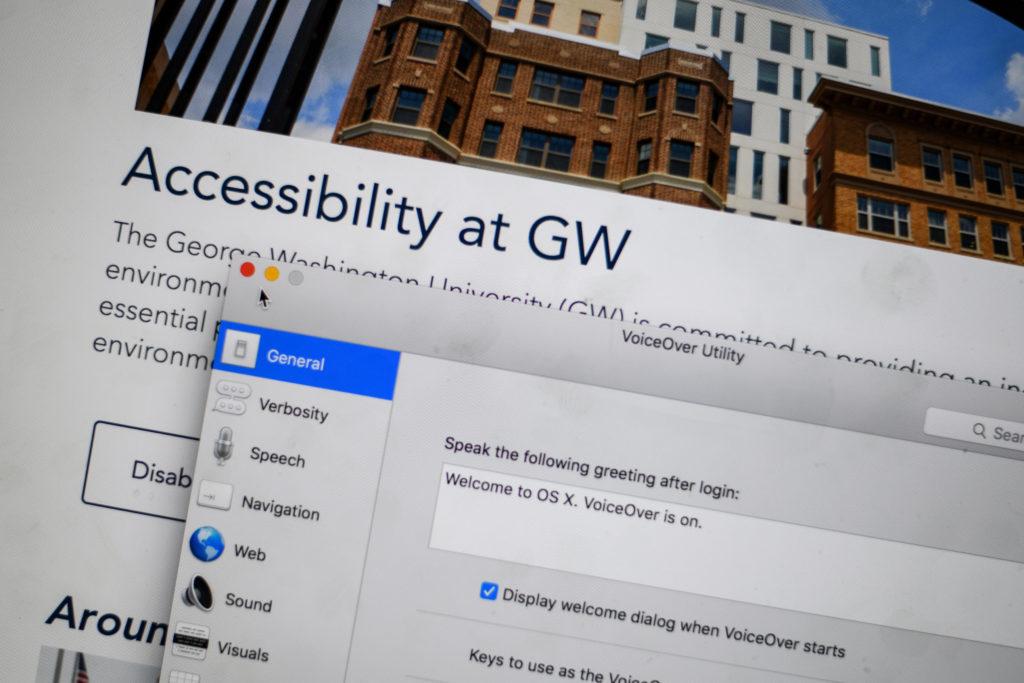As the Department of Education investigates GW for alleged disability discrimination based on the accessibility of its websites, officials say they’ve formed a task force to examine the issue.
The complaint, which launched an investigation that began in April, has prompted a federal probe of the University’s policies and procedures regulating online accessibility. Experts said the inquiry may require GW to change how it manages website features so that students with disabilities aren’t put at an academic disadvantage.
University spokeswoman Lindsay Hamilton said digital accessibility has been a priority for “many years,” and that officials launched the task force, which includes representatives from External Relations, the Division of Information Technology, Division of Student Affairs and the Office of the Provost, last fall.
Hamilton said some technology the University uses is updated and changed frequently, which makes monitoring website accessibility issues, like tab navigation, video captioning and photo captions, very difficult.
“The University is committed to providing an inclusive and accessible environment, which extends to University websites and digital content,” she said in an email.
Hamilton said officials utilize several free and subscription-based services that monitor GW’s online features to ensure accessibility, but some of those issues take longer to fix than others, requiring web developers and external vendors to assist in a review.
She declined to comment on the specifics of the task force, including if it was formed in direct response to the federal complaint, how often it meets, how many members it has and if recommendations will be released from the group.
An analysis of several of the University’s core websites, including the main website and homepages for the Columbian College of Arts and Sciences, revealed that numerous photos and videos lack text-descriptions and closed captions.
GW is one of more than 2,000 elementary, secondary and post-secondary schools facing federal disability investigations as of Jan. 12, according to the Department of Education’s website. The Hatchet became aware of the investigation earlier this month after the department released a database tracking civil rights inquiries on the basis of sex, race, age and disability.
While officials said the complaint is not about the physical accessibility of campus buildings, students with disabilities have voiced concerns about accommodations in several, especially older, buildings. The number of students registered with Disability Support Services hit an all-time high last year.
Disability experts said the complaint could have been filed by a student, faculty member or outside advocacy organization, and while the length of the investigation depends on each individual case, it’s not surprising that the probe would have pushed the University to complete its own review of website accommodations.
Namita Gupta, a staff attorney for the Disability Rights Education & Defense Fund, said a complaint must be filed within 180 days of an incident of alleged disability discrimination. She said this type of investigation can take several months, often with both federal and University officials involved in reviewing the school’s accessibility standards.
“It’s always good practice for universities to audit their systems and policies and whether their websites are accessible or inaccessible and remedy that,” she said.
Allison Butler, the director and ADA compliance officer for the Office of Equity and Inclusion at Emory University, said a major challenge that schools face is making sure that all online videos have closed-captions, an accommodation that can be costly and time-consuming.
“Let’s say if you have a 30-minute video and you have let’s say 12 of those you want to post if it’s a training program or something like that, we have to make sure they’re captioned if they’re open to the public,” she said. “That can cost in the thousands to hundreds of thousands depending on the program and how many videos that they’re utilizing.”
Butler said this type of investigation is often initiated by a student, and is sometimes even launched after an advocacy group, like the National Federation of the Blind, works with a student taking a course with a disability to act as a “plant” to evaluate the accessibility of online materials.
“It could be someone who is interested in a program and doing some research and realizes that the program may not be compatible and they automatically don’t have access to getting the information they need,” she said.
Luci Masredjian, the disability services coordinator at Occidental College, said it is critical for hearing-impaired students to have access to videos with closed-captions and to have text descriptions of all visual aspects of a website, so that students can effectively use screen-reader programs.
If the materials are not accessible, then a student will struggle with their academic work on top of the inherent challenges of navigating university life with a disability, she added.
“The hardest thing about websites is making sure that any external links that are posted on the website, making sure that wherever that link goes, that is also accessible,” she said.
Masredjian said individual student feedback is often valuable because students are the ones most impacted by these issues. She said universities often have to edit webpages, add captions on videos or change file formats to accommodate students.
“If a particular student writes me or anybody in the college and says, ‘hey, I can’t access this,’ it’s our responsibly to, as soon as possible, be able to remedy that,” she said.
Liz Konneker and Sarah Roach contributed reporting.





